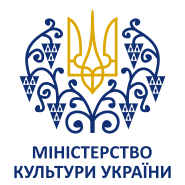
Anatoliy Kyrylovych Kinakh is a Ukrainian politician and honorary professor at the Mykolaiv Government Humanitarian University. Kinakh is a former People's Deputy of Ukraine. Kinakh currently serves as the leader of Party of Industrialists and Entrepreneurs of Ukraine.
The Cabinet of Ministers of Ukraine, commonly referred to as the Government of Ukraine, is the highest body of state executive power in Ukraine. As the Council of Ministers of the Ukrainian SSR, it was formed on 18 April 1991, by the Law of Ukrainian SSR No.980-XII. Vitold Fokin was approved as the first Prime Minister of Ukraine.

The Ministry of Internal Affairs of Ukraine is the ministry of the Ukrainian government that oversees the interior affairs of Ukraine. The ministry carries out state policy for the protection of rights and liberties of citizens, investigates unlawful acts against the interest of society and state, fights crime, provides civil order, ensures civil security and traffic safety, and guarantees the security and protection of important individuals. It is a centralised agency headed by the Minister of Internal Affairs. The ministry works closely with the office of the General Prosecutor of Ukraine. It oversees the National Police of Ukraine, National Guard of Ukraine (gendarmerie), the State Emergency Service of Ukraine, State Border Guard Service of Ukraine and the State Migration Service.

Viktor Mykhailovych Pynzenyk is a Ukrainian politician, economist, and former Minister of Finance. He is the former leader of the Reforms and Order Party.
The Ministry for Development of Economy and Trade is the main authority in the system of central government of Ukraine responsible for formation and realization of state economic and social development policies ; regulation of consumer prices; industrial, investment and trade economic policies; development of entrepreneurship; technical regulation and security of consumer rights; inter-agency coordination of economic and social cooperation of Ukraine with the European Union. In 2019-2020 it also encompassed functions of the Ministry of Agrarian Policy and Food.
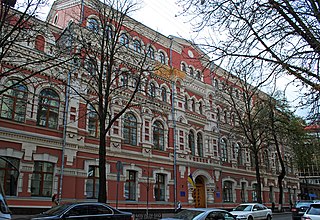
The Ministry of Communities and Territories Development was the Ukrainian government ministry responsible for public housing infrastructure development. It was dissolved on 2 December 2022.

The second Azarov government was the government of Ukraine from 24 December 2012 to 28 January 2014. It was dissolved amidst the Euromaidan protests. The ministers (except Prime Minister Mykola Azarov who was replaced by Deputy Prime Minister Serhiy Arbuzov, continued briefly as a caretaker government. On 27 February 2014 Ukraine's parliament approved a resolution to formally dismiss the government.

The Ministry of Education and Science of Ukraine is the main body in the system of central bodies of the executive power of Ukraine.
People's Commissariat of State Security of the UkrSSR or NKDB of the UkrSSR was a union-republican agency of state security that was created for the first time on March 12, 1941 according to ukase of the Presidium of the Verkhovna Rada of the Ukrainian SSR and which verbatim copied ukase of the Presidium of the Supreme Soviet of the Soviet Union of February 3, 1941. Pavlo Meshyk was appointed a narkom.
The ministries of the Ukrainian Soviet Socialist Republic were central bodies of state administration of the Ukrainian SSR as republican ministries of the Soviet Union. Among other central bodies of state administration there also were committees, state committees, and other agencies. After World War II in 1946 ministries uniformly as throughout the rest of the Soviet Union replaced the existing People's Commissariats. The ministries were part of the Council of Ministries of the UkrSSR until 18 April 1991 when the latter was reformed into the Cabinet of Ministries of the UkrSSR.
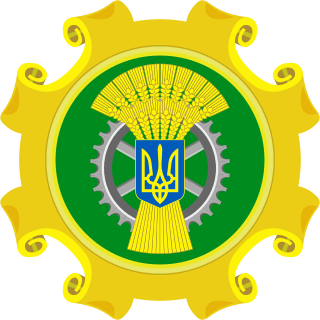
The Ministry of Agrarian Policy and Food is the central executive authority of Ukraine in charge of country's agro-development. It is one of the oldest government agencies of Ukraine. On 29 August 2019 the ministry's function were taken over by the Ministry of Economic Development, Trade and Agriculture. On 17 December 2020 the ministry was resurrected.

Ministry of Youth and Sports of Ukraine is a government of Ukraine ministry established on 6 June 1991 after reorganization of the Soviet State Committee of the Ukrainian SSR in affairs of youth and sports. As a ministerial government department, it exists with some breaks since 1991. It was reestablished again in 2013 by splitting away from the Ministry of Education and Science where it existed as its subdepartment in 2010–2013.

Yuri Vasylovych Prodan is Ukrainian power engineer and politician. He has served as Minister of Fuel and Energy of Ukraine of 18 December 2007 to 11 March 2010, and Minister of Energy and Coal Industry of Ukraine from 27 February 2014 till 2 December 2014. In December 2005, received the title of Honored power engineer in Ukraine.

Yevhen Mykolayovych Nyshchuk is Ukrainian theater and cinema actor, Merited Artist of Ukraine and a former Minister of Culture of Ukraine. He held the post from February to December 2014, and again from April 2016 to August 2019.

The second Yatsenyuk government was created in Ukraine after the 2014 Ukrainian parliamentary election. On 2 December 2014, 288 members of the Ukrainian parliament approved the composition of the cabinet. The Government was backed by Petro Poroshenko Bloc, People's Front, Self Reliance, Fatherland and Radical Party.
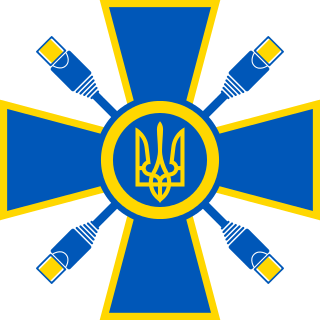
The Ministry of Information Policy or MIP was a government ministry in Ukraine established on 2 December 2014. The Honcharuk Government abolished the Ministerial post. The government institution was revived in March 2020 as part of the Ministry of Culture and Information Policy.

Anton Yuriyovych Gerashchenko is a current official advisor and a former deputy minister at the Ukrainian Ministry of Internal Affairs. He is a former member of the Ukrainian parliament from 2014 to 2019, and was the subject of an assassination attempt in part because of his actions, which was prevented by the SBU.
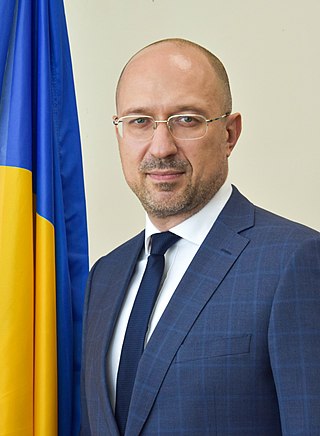
The Shmyhal government is the current government of Ukraine, formed on 4 March 2020 and led by Denys Shmyhal, who was previously serving as Deputy Prime Minister in the Honcharuk government, and the Governor of Ivano-Frankivsk Oblast.
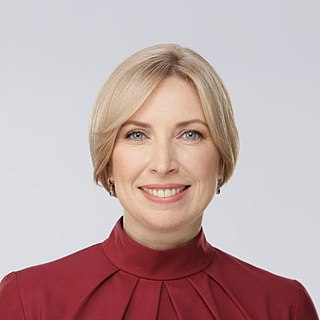
Iryna Andriivna Vereshchuk is a Ukrainian social activist, politician, and former People's Deputy of Ukraine of the 9th convocation. On 4 November 2021, Vereshchuk was appointed Deputy Prime Minister of Ukraine and Minister of Reintegration of Temporarily Occupied Territories.

The COVID-19 vaccination campaign in Ukraine is an ongoing mass immunization campaign for the COVID-19 pandemic in Ukraine.
